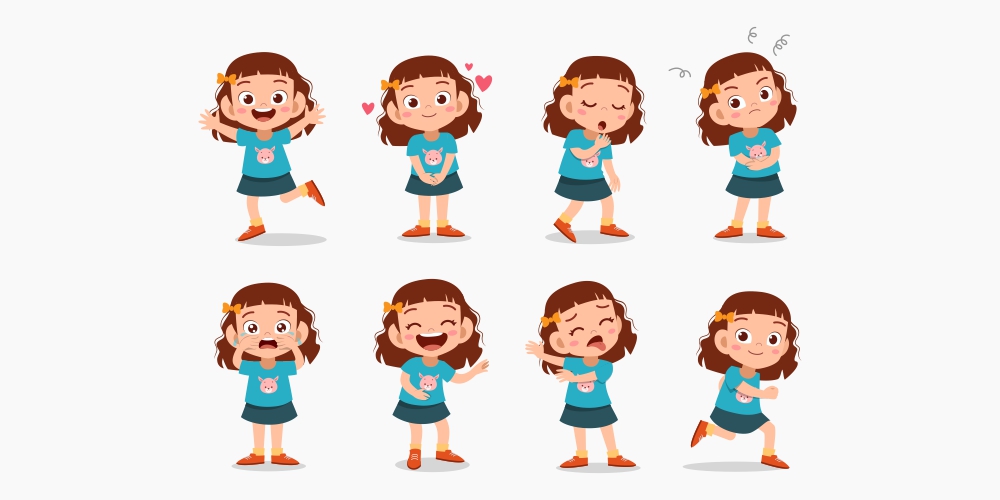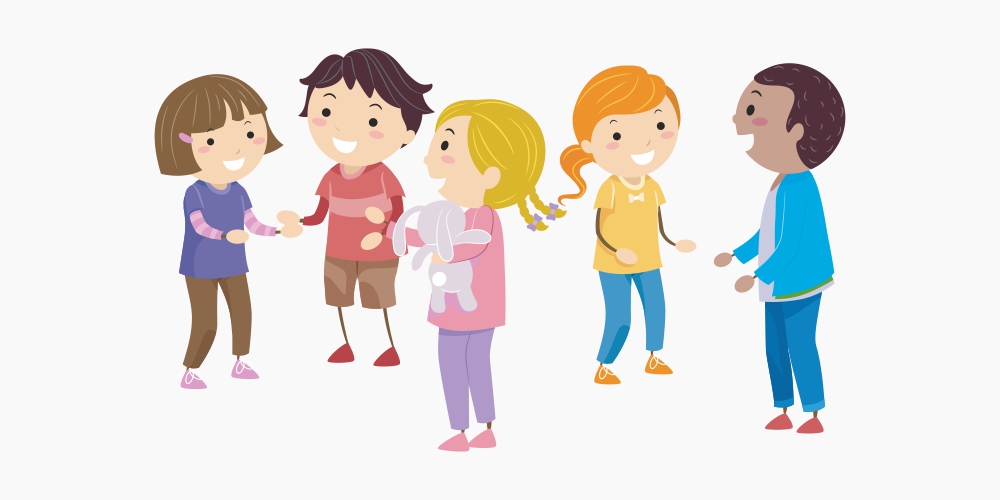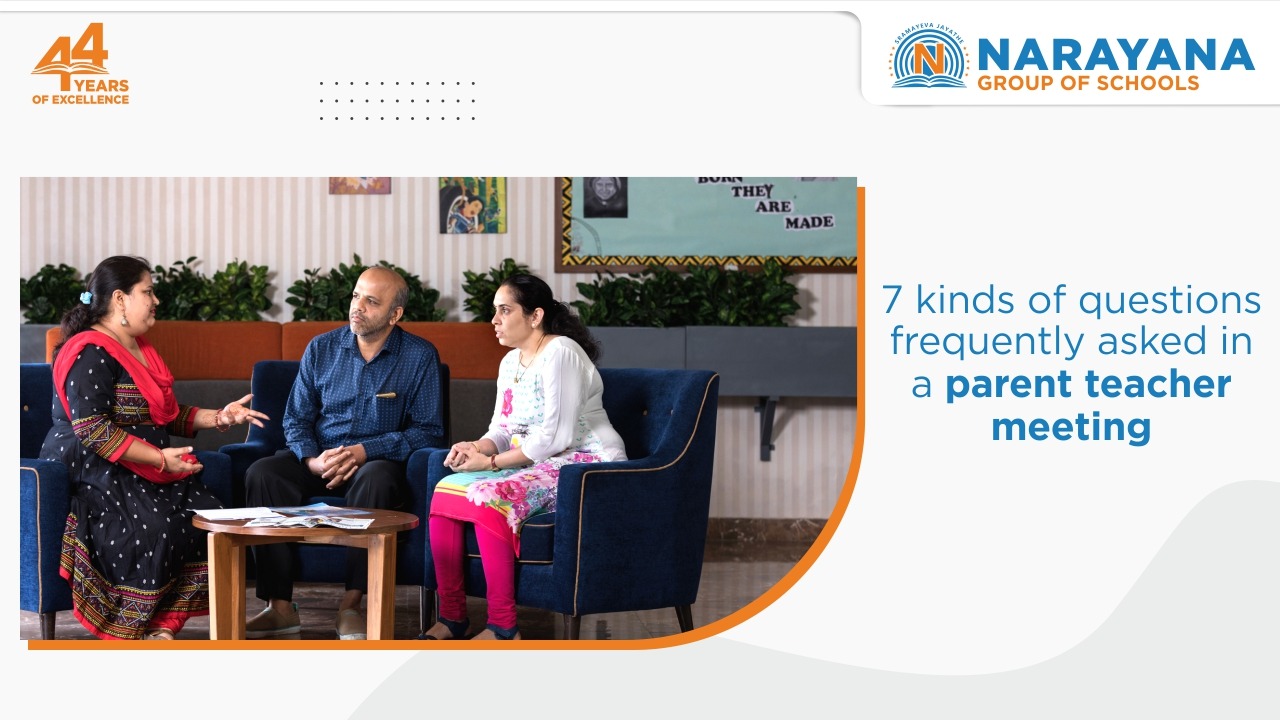7 Kinds of Questions Frequently Asked in a Parent Teacher Meeting
As a parent, you understand how important it is to be involved in your child’s education at school. If there is an open discussion between parents and teacher, then the child will eventually benefit the most. Efforts in this direction will help secure a great future for your child.
The Dussehra holidays are now over, and it’s time for the results. It is possible that you will have doubts and questions. A parent teacher meeting is the most appropriate occasion to have this discussion. But we need to know the right questions to ask.
Parent teacher meeting questions should be clear, as you have limited time in these meetings. The questions should also be very relevant to the overall development of your child, including questions about more than just academics.
What you can do is categories the types of questions to cover each important area of your child’s student life. In this blog, we will help you find important questions to ask during a parent teacher meeting.
1.General Questions Concerning Your Child
At the start of the parent teacher meeting, you can ask basic questions about your child.
- How does my child behave in school?
- What do you think my child’s talents are?
- What activity does my child enjoy the most?
- Does my child encounter any challenges when trying to communicate with you?
- How do you promote critical and creative thinking in the class?
2.Academic Performance
For questions related to academic performance, you will have to ask both the class teacher and different subject teachers.
To the class teacher:
- Is his/her performance in the exams satisfactory?
- Which subject(s) does the kid have an interest in?
- Is there any subject that my kid needs extra help with?
- How does my child perform in quizzes and tests?
- How is my kid faring in terms of discipline, participation, answering questions, and behaviour in the classroom?
Subject teacher:
- How well is my child performing academically in your subject?
- My kid isn’t clear about some topics; can you let us know what we can do? Are any books or reference materials available?
- How often do you schedule tests?
- To language teacher – Is my child a good reader? Is he/she able to comprehend the text?
- If you think that it will help, can you make my child sit with a kid who behaves well and has good grades in your subject?
- To 2nd/3rd language teacher – Can you make a separate batch for children who are not native speakers? Because learning a new language is challenging for both children and parents.
3.Emotional Behaviour:

Make sure your parent teacher meeting questions include your concerns for your child’s emotional well-being.
- How is my child in general? Cheerful/cranky/moody, etc.?
- How is my child’s behavior with teachers and classmates?
- How do you promote self-confidence in students?
4.Social Behaviour

Parent teacher meetings should also be used to inquire about your child’s social life at school. How your child behaves socially impacts their school experience significantly?
- Is my child good at forming and maintaining friendships?
- Does my child participate in debates and discussions with other students in the classroom?
- In the classroom, is my child an introvert or an extrovert?
5.Homework
You should also clear all your doubts regarding your child’s homework.
- How is my child’s progress on his homework? Is he/she regular in doing it?
- According to you, how much time is enough at home to complete the homework?
- Is homework given every day? Can you provide me with a schedule?
6.Parent’s role
You can also ask how you, as a parent, can contribute to your child’s learning at home. In a parent teacher meeting, you should try to understand the teacher’s vision and what they expect from you.
- What methods can I use at home to improve my child’s learning?
- How do I help my kid with self-study at home?
- What can I do at home to support the expectations you have for student behaviour in class?
- Would you like me to tell you more about my child, including likes, dislikes, special skills, etc., if it helps you understand him/her better?
- What is the best way for me to prepare my child for tests and assignments?
7.Other issues including sensitive topics (if any)
There can be other issues at home that affect your child. Make sure you are open about them with the teacher, as this will help teachers understand your child’s behaviour better. You can also inquire about the school’s policies regarding situations such as bullying and fighting.
- If it helps you understand the child, should I tell you about my family situation and the kind of issues that the child faces?
- What is the school’s anti-bullying policy? How do we handle a situation like that if it occurs?
Parent teacher meetings are one of the most effective tools you have as a parent. Use them to build a rapport with the teacher, understand their teaching style, what are your child’s strengths and weaknesses, and how your child does socially and emotionally while they are at school.
We have provided a few questions for you in each category. Choose your questions carefully keeping your child in your mind. Make sure you are prepared with your questions before you walk into the meeting room. Your aim should be to cover each aspect of your child’s education.
Want a school that takes care for your children’s unique learning style and provide the best care, guidance, and education? Admissions are open at Narayana for Academic year 2024-25. Leave it to us to sculpt your child’s journey towards excellence. Register now!

I want to know why is it other activities are not given much importance for kids?
My child in Nalgonda E techno
All most all I visite the school around 10 to 15 times. And notice to principal incharge class teacher PET madam several times but never rectify the what I arises
1.Nill decipline
2. Floor cleaning
3. Class room maintenance
4. major issue bath rooms leakage
5. Building alway dirty wet….
6. No language skills
7.No hand writing books maintenance
Good evening .
This is one of good way to take over the children’s.
Make them go to steady and strong.
It will grow up good education.
It will helps to kid and teacher interact.
Thank you.
The blog was very helpful and very informative to a parent regarding PTM.
Very good matter, thanku,
Very useful information for the parents to effectively ask and use the time in PTM.
I learn good ponits in this topic
Continue for 2024
All points are very important n useful
I feel both the teacher and the parent play a remarkable irole for the child.
Regular updates about child’s growth is very necessary.
It is a very useful and important topics for parents regarding PTM we can get the childs information update and self-confidence ,behaviour ,skills, studying ,ect. and their improvements. Also, this is a good way to take care of children’s .
Thank You
It is a very useful and important topics for parents regarding PTM we can get the childs information update and self-confidence ,behaviour ,skills, studying ,ect. and their improvements. Also, this is a good way to take care of children’s it helps conversation with the children and teachers also.
Thank You
It is a very useful and important topics for parents regarding PTM we can get the childs information update and self-confidence ,behaviour ,skills, studying ,ect. and their improvements. Also, this is a good way to take care of children’s it helps conversation with the children and teachers also. Thank you
This topic is very helpful.
Very useful information
This is very important and useful for me
Good afternoon
This information is very important n useful.
Thanku
Respected Sir and Madam,
1.How can I improve my child’s communication skills?
2.How to foster cultural development?
3.
How to develop physical and mental skills?
Kindly focus above skills.
Thank you for this platform to convey our thoughts.
It’s very informative and valuable text material….. PTM is very important for kids all over observation .
All points are important and usefull also.
Fact. All you said was absolutely correct.
Most useful information for the parents needed essential for the current situation .
Thank you so much
Dear Mam/ sir
All the points were very important and noted🙏🏻. This helps us a lot for interaction with the teachers. As the child spends more time with the teacher she/ he will be the best mentor to take the child to next level. Thanks a loads.
Regards
Anuradha Chandrashekar
Very Good information
The Information from the topic was very useful and informative.
Very good information
Thank you giving ideas and questions need to ask on parent teacher meeting
Thanks a lot for about information so that we can ask to teacher in a meeting, very much informative
This is important for ptm Very useful thank u
Informative article, exactly what I needed.
Thank you giving ideas and questions need to ask on parent teacher meeting
Thanks very much for Good suggesion.
Thanks, this is very informative and will help me to clear all points about my daughter ‘s education and rest of all activity.
Is Teachers following their behaviour pattern with students especially your computer teacher,how he gives examples like murder and suicide to students and warnings like torning books if find s any mistakes in writing.. please rectify from your end.
Thank you for providing this informative questions. Its help us to putting questions to teacher about our child performance academically and behaviorally.